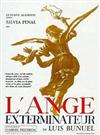|
|
||||
|
|
by Donald Levit  On the heels of the Falange ban on Viridiana after they had approved and invited its being made in Bosley Crowther surmised that the film’s sluggish reception was caused by the “creep[ing] into the patience of the audience” of the very frustrated ennui that enmeshes the characters portrayed. The usual aberrant fetishistic sex is absent, it is true, and the Church perhaps a cuttable afterthought, but the resultant tightening of theme, however, allows this to be one of the master director’s most concentrated and unambiguous works. So much so that relatively streamlined “allegory” crops up in considerations, although that term is not appropriate in the strictest sense, for the numerous characters (with many actors uncredited) are pretty interchangeable, indeed confusing, and together are “symbolic” in representing more or less the same quality. As usual writing dialogue and screenplay -- this time from an adaptation of a play by José Bergamín, Los náufragos (“the shipwrecked ones”) -- Buñuel creates a cyclical structure. This is emphasized from the beginning, which initially seems a puzzle or mistake in certain scenes and lines repeated verbatim, all of which will later prove a solution to the impasse as well as an underlining of the whole. Some have questioned the advisability of the final minute in a church and dismissed the scene as extraneous tacking on of the Spaniard’s habitual spleen against Rome, but it, too, is just a sly tweaking repetition, a reminder that escape from one particular prison of our own device does not mean that man is free of what, in defense of L’Age d’Or, Henry Miller saw as “the lunacy of civilization.” In the course of an inclement evening at the opera, the rich Nobiles, Edmundo and Lucía ( Enrique Rambal, Lucy Gallardo), invite select wealthy patrons and performers of the arts to an after-dinner at their house. Previously content in their employ, and for reasons the staff itself cannot explain, maids, cooks and butlers desert ship “like rats,” suddenly leaving on lame excuses and being fired for the dereliction. With suave majordomo Julio (Claudio Brook) the only one sticking to his post -- and pratfalling while serving a special dish -- the meal is a series of not so sotto voce catty comments, non-sequiturs and empty snooty chat. The final act concluded, with a piano concerto by guest Blanca (Patricia de Morelos) it is time to disperse, but for one non-reason after another, no one can actually get up and leave. Mystified but citing the late hour and rain, they variously take the unprecedented step of removing dinner jackets, stoles and pumps to bed down on furniture and floor. The outside world of families and other responsibilities beckons, but through succeeding nights and days the enigmatic situation continues, or, rather, worsens. Food and water run out, there are sickness, suicide and death but not even an aspirin, while a stash of recreational morphine is gobbled up. Real and symbolic, the stench of the rich’s unwashed bodies becomes unpleasant. There are other failed attempts to up and leave, acrimonious backbiting and blame gaming, a falling apart of polite veneers, and hallucinations and a spot of sexual frustration, while gawkers, police, officials and ex-Nobile employees gather outside but are powerless to enter. The situation in extremis, opera singer Leticia (Silvia Pinal) nicknamed in jealous nastiness “La Valkiria” (Valkyrie) hits upon the answer, the situation and her solution surprisingly never picked up later by some sci-fi horror scriptwriter. Repetition of initial action, location and speech is the key, though only to walk out of this circle of hell piously on into another. Speaking two years earlier of his fascination with ambiguity, Buñuel advanced that “if a work is obvious, as far as I’m concerned it’s done for.” Yet, absent sex and dream lauded as “surreal” but as usefully considered “unreal,” The Exterminating Angel is among his most accessible and attractive films. (Released by Altura Films International; not rated by MPAA.) |
||
|
© 2026 - ReelTalk Movie Reviews Website designed by Dot Pitch Studios, LLC |



